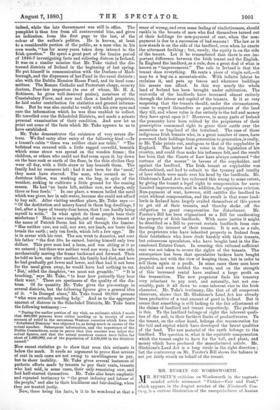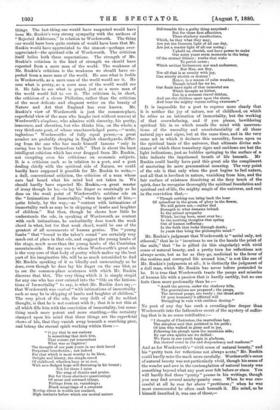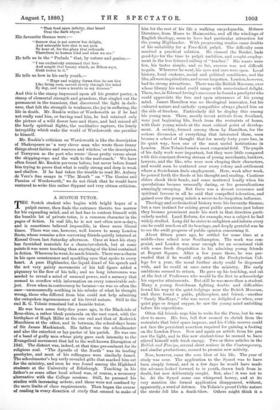MR. RUSKIN ON WORDSWORTH.
AIR. RUSKIN'S criticism on Wordsworth in the vagrant- 1 minded article misnamed " Fiction—Fair and Foul," which appears in the August number of the Nineteenth Cen- tury, is a curious illustration of the unexpectedness of human
things. The last thing one would have suspected would have been Mr. Ruskin's very strong sympathy with the authors of "Rejected Addresses," in relation to Wordsworth. The thing one would have been quite certain of would have been that Mr. Ruskin would have appreciated to the utmost—perhaps over- appreciated—the spiritual side of Wordsworth. The criticism itself belies both these expectations. The strength of Mr. Ruskin's criticism is the kind of strength we should have expected from a mere man of the world. The weakness of Mr. Ruskin's criticism is the weakness we should have ex- pected from a mere man of the world. He sees what is feeble in Wordsworth, as a mere man of the world would see it. He sees what is pretty, as a mere man of the world would see it. He fails to see what is grand, just as a mere man of
the world would fail to see it. The criticism is, in short, the criticism of a clever Philistine, rather than the criticism
of the most delicate and eloquent writer on the beauty of Nature and Art that England has ever known. Mr.
Ruskin's view of Wordsworth is just the common-place, superficial view of the man who laughs (not without reason) at
Wordworth's simplesse, who admires with sincerity, his purity, innocence, and elevation, but who thinks him, on the whole, a
very third-rate poet, of whose unacknowledged peers,—" mute, inglorious " Wordsworths of fully equal power,—a great number are probably sleeping in English churchyards, differ- ing from the one who has made himself famous " only in caring less to hear themselves talk." That is about the least intelligent criticism which has ever dropped from Mr. Ruskin, not excepting even his criticisms on economic subjects.
It is a criticism such as in relation to a poet, and a poet dealing chiefly with the spiritual side of Nature, we could hardly have supposed it possible for Mr. Ruskin to write,— a dull, conventional criticism, the criticism of a man whose ears had heard what his mind had not taken in. We should hardly have expected Mr. Ruskin,—a great master of irony though he be,—to lay his finger so unerringly as he
does on the weak point of Wordsworth's sublime ode on the " Intimations of Immortality," when he speaks of him,—
quite falsely, by the way,—as " content with intimations of immortality such as may be in skipping of lambs and laughter of children." But then, though he shows how little he understands the ode, in speaking of Wordsworth as content with such intimations, he undoubtedly does touch the weak chord in what, but for that weak chord, would be one of the greatest of all monuments of human genius. The "young lambs " that " bound to the tabor's sound " are certainly very much out of place in that ode, and suggest the young lambs of the stage, much more than the young lambs of the Cumbrian mountain-side. But any one to whom Wordsworth's great ode is the very core of that body of poetry which makes up the best
part of his imaginative life, will be as much astonished to find Mr. Ruskin speaking of it so blindly and unmeaningly as he does, even though he does lay his finger on the one blot, as to see the common-place acuteness with which Mr. Ruskin discerns that blot. The very thing which it is simply stupid for any one who has ever entered into the " Ode on the Intima- tions of Immortality" to say, is what Mr. Ruskin does say,— that Wordsworth was content "with intimations of immortality such as may be in skipping of lambs and laughter of children." The very pivot of the ode, the very drift of all its noblest thought, is that he is not content with it; that it is not this at all which fills him with the conviction of immortality, but some- thing much more potent and more startling,—the certainty stamped upon his mind that these things are the superficial shows of life, that they vanish away beneath a searching gaze, and betray the eternal spirit working within them :— " 0 joy that in our embers
Is something that doth live, That nature yet remembers What was so fugitive!
The thought of our past years in me doth breed Perpetual benediction ; not indeed For that which is most worthy to be blest, Delight and liberty, the simple creed Of childhood, whether busy or at rest, With new-fledged hope still flattering in his breast ; Not for these I raise The song of thanks and praise, But for those obstinate questionings Of sense and outward things, Fallings from us, vanishings ; Blank misgivings of a creature Moving about in worlds not realised, High instincts before which our mortal nature
Did tremble like a guilty thing surprised :
But for these first affections, These shadowy recollections, Which, be they what they may, Are yet the fountain light of all our day, Are yet a master light of all our seeing ; Uphold us, cherish, and have power to make Our noisy years seem moments in the being Of the eternal Silence : truths that wake To perish never ; Which neither listlessness, nor mad endeavour, Nor Man, nor Boy, Nor all that is at enmity with joy, Cau utterly abolish or destroy !
Hence, in a season of calm weather, Though inland far we be, Our Souls have sight of that immortal sea Which brought us hither, Can in a moment travel thither, And see the children sport upon the shore, And hear the mighty waters rolling evermore."
It is impossible for a poet to express more clearly that it is neither the joy of nature, nor of childhood, on which he relies as an intimation of immortality, but the working of that overwhelming, and if you please, bewildering spiritual life in us which assails the mind with assevera- tions of the unreality and unsubstantiality of all these
natural joys and signs, but at the same time, and in the very same act in which it declares this unreality, forces upon us the spiritual basis of the universe, that ultimate divine sub- stance of which these transitory signs and emblems are but the light indications, just as bubbles springing to the surface of a lake indicate the imprisoned breath of life beneath. Mr Ruskin could hardly have paid this great ode the compliment of mastering its mere grammatical meaning. The very point of the ode is that only when the poet begins to feel nature, and all that is loveliest in nature, vanishing from him, and the fair surface of existence dissolving at the fiery touch of the spirit, does he recognise thoroughly the spiritual foundation and spiritual end of life, the mighty magic of the universe, and rest
in the conviction that,—
" Though nothing can bring back the hour Of splendour in the grass, of glory in the flower,
We will grieve not,—rather find Strength in what remains behind.
In the primal sympathy Which, having been, must ever be ; In the soothing thoughts that spring Out of human suffering ; In the faith that looks through death;
In years that bring the philosophic mind."
Mr. Ruskin's judgment that Wordsworth is " aerial only, not ethereal," that he is " incurious to see in the hands the print of the nails," that " he is gifted (in this singularly) with vivid sense of natural beauty, and a pretty turn for reflections not always acute, but as far as they go, medicinal to the fever of the restless and corrupted life around him," is not like one of Mr. Ruskin's judgments at all ; it is distinctly the judgment of a dull man, which Mr. Ruskin has never before pretended to be. It is true that Wordsworth treats the pangs and miseries of human life with a passion that is hardly earthly, but no one feels them more profoundly than he :—
" Amid the groves, under the shadowy hills,
The generations are prepared ; the pangs, The internal pangs, are ready ; the dread strife Of poor humanity's afflicted will Struggling in vain with ruthless destiny."
No poet of any day has sunk a sounding-line deeper than Wordsworth into the fathomless secret of the mystery of suffer- ing that is in no sense retributive :— "I thought of Chatterton, the marvellous boy,
The sleepless soul that perished in his pride; Of him who walked in glory and in joy, Following his plough upon the mountain side; By our own spirits are we deified : We Poets in our youth begin in gladness, But thereof come in the end despondency and madness."
And as for Wordsworth's "vivid sense of natural beauty," and his "pretty turn for reflections not always acute," Mr. Ruskin could hardly miss the mark more carefully. Wordsworth's sense of natural beauty was not particularly vivid, though his sense of the wonder and awe in the contemplation of natural beauty was something beyond what any poet ever felt before or since. You will hardly find three "pretty" poems in his writings, though you may find several namby-pamby ones. When he was suc- cessful at all he rose far above " prettiness ;" when he was most unsuccessful he often sank beneath it. His mind, as he himself described it, was one of those,—
" That feed upon infinity, that brood Over the dark abyss."
His favourite themes were :-
" Sorrow that is not sorrow but delight, And miserable love that is not pain To hear of, for the glory that redounds Therefrom to human kind and what we are."
He tells us in the " Prelude " that, by nature and genius,— " I too exclusively esteemed that love And sought that beauty which, as Milton says, Math terror in it."
He tells us how in his early youth,— "Huge and mighty forms that do not live Like living men, moved slowly through the mind By day, and were a trouble to my dreams."
And this is the stamp impressed upon all his greater poetry, a stamp of elemental strength and grandeur, that singled out the permanent in the transient, that discovered the light in dark-
ness, that felt the strength in weakness, the joy in suffering, the life in death. Mr. Ruskin writes of Wordsworth as if he had not really read him, or having read him, he had retained only the picture of a wild flower here and there, and had missed all the hardy spiritual flights, the meditative rapture, the lonely
intrepidity which make the world of Wordsworth one peculiar to himself.
Mr. Ruskin's criticism on Wordsworth is like the description of Shakespeare as ' a very clever man who wrote those funny things about fairies and weavers and witches,' or the description of Tennyson as the poet who wrote those pretty verses about the skipping-rope and the walk to the mail-coach.' We have often found Mr. Ruskin perverse before, but never before found him trying to prove that what is really strong and deep is weak
and shallow. If he had taken the trouble to read Mr. Aubrey .de Vere's fine essays in " The Month " on " The Genhui. and
Passion of Wordsworth," we do not think that he would have ventured to write this rather flippant and very obtuse criticism.




































 Previous page
Previous page